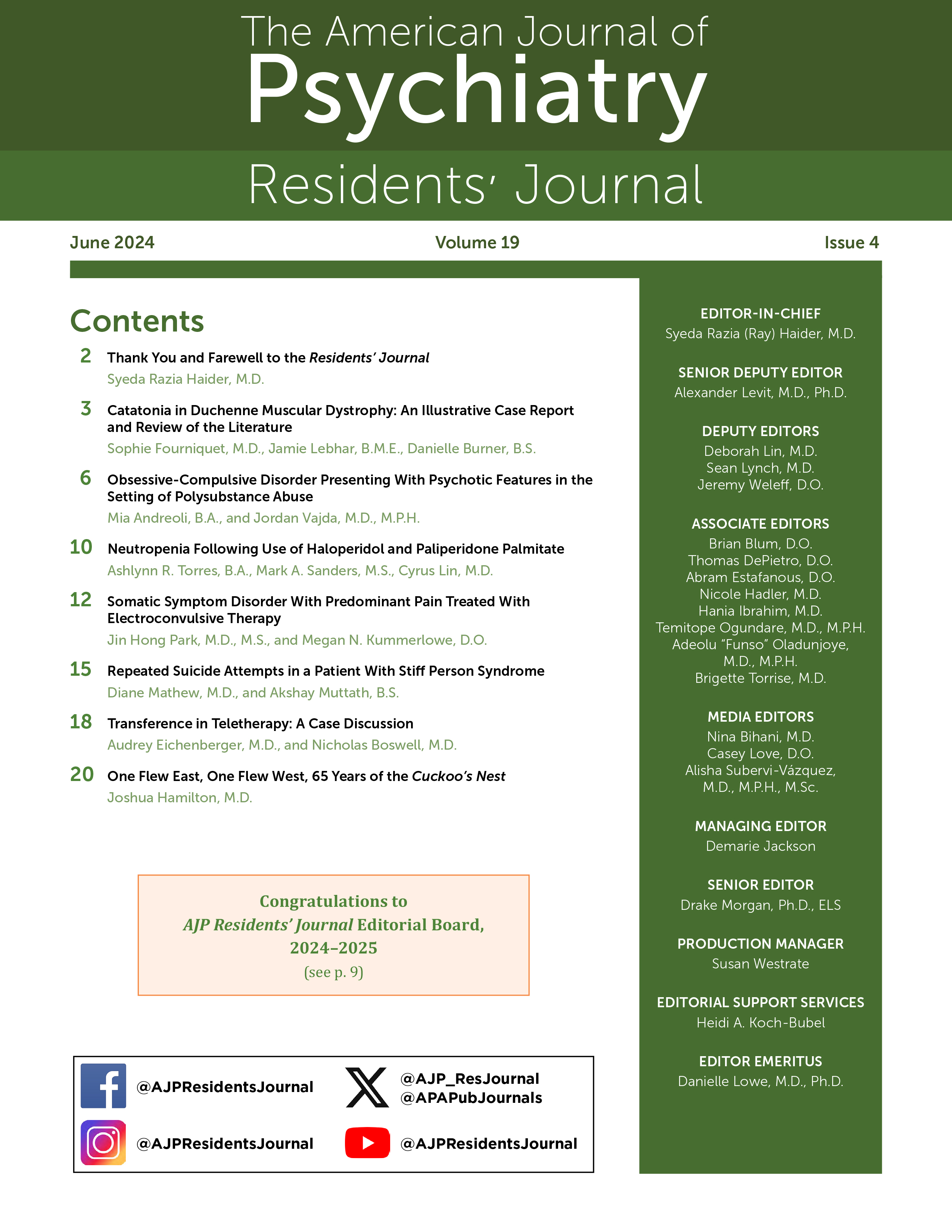Welcome to the final issue of the 19th volume of the American Journal of Psychiatry Residents’ Journal (AJP-RJ)!
I am excited to present this collection of six case reports, as well as an Arts and Culture piece authored by a former editorial board member. Authors wrote these case reports at different stages of training (medical students, residents, and fellows), and I believe that they can be a particularly valuable learning tool for fellow trainees. These studies highlight the complexities of patient care, diagnosis, and management that we encounter in our daily work. I hope our readers can glean insight from the authors’ thoughtful approaches and discussion of the relevant literature.
This issue also marks the end of my tenure as the editor-in-chief of AJP-RJ. This month, I will be completing my geriatric psychiatry fellowship training and moving on to the next phase of my career to begin work as an attending psychiatrist. Although I am excited for the next chapter of my professional life, this is also a bittersweet moment for me. AJP-RJ has served as my academic home for the past 5 years, initially as a reader, then as an editorial board member, and finally as the editor-in-chief. As a trainee-led journal, AJP-RJ serves an important purpose in providing a platform for trainees to present their work to their peers. Serving in the role of editor-in-chief has been an honor for which I am grateful.
In my reflections on my time in psychiatry training and with AJP-RJ, one theme that stands out is the immense benefit of learning from others in our field. I found this evident in the parallels between my clinical work and my editorial work. Just as words are our medium for providing a supportive space for growth to psychiatric patients, editing my colleagues’ work has given me opportunities to foster the growth of fellow trainees in their academic endeavors. Just as I have been humbled by the power inherent in making the tough judgment calls that are a part of practicing psychiatry, I have been humbled by the nuances of feedback and decision making leading up to publication. As a result of these experiences, my passion for education and learning has only grown.
Since I officially began my role as editor-in-chief on July 1, 2023, AJP-RJ has received over 150 manuscript submissions. This success could not have been achieved without the dedication and hard work of the many people who have contributed to the journal. I am thankful to the editors-in-chief emeriti, Austin Blum, M.D., J.D., for taking a chance on me by appointing me to the RJ editorial board, and Danielle Lowe, M.D., Ph.D., for trusting me to be her successor. I want to acknowledge our current editorial board members who volunteered innumerable hours outside of their routine clinical work to help our journal. Our senior deputy editor, Alexander Levit, M.D., Ph.D., has consistently impressed me with his unrelenting commitment, efficiency, and attention to detail. Our deputy editors, Drs. Deborah Lin, Sean Lynch, and Jeremy Weleff, and associate editors, Drs. Brian Blum, Thomas DePietro, Abram Estafanous, Nicole Hadler, Hania Ibrahim, Temitope Ogundare, Adeolu “Funso” Oladunjoye, and Brigette Torrise, have been immensely instrumental in shaping this journal. I have appreciated the unfailing support of our ad hoc reviewers, Drs. Olufunlola Adefalu, Dustin Brinker, Donald Egan, David Freedman, Faris Katkhuda, Can Misel Kilciksiz, Mehmet Utku Kucuker, Mohammad Lesanpezeshki, Natasha Massoudi, Sean Oldak, Nicola Park, Melissa Peace, Ben Shuham, and Wesley White. Lastly, I want to extend special thanks to our media editors, Drs. Nina Bihani, Casey Love, and Alisha Subervi-Vázquez, who worked behind the scenes tirelessly to manage our social media platforms and podcasts.
As I conclude my tenure at AJP-RJ, I am enthusiastic to pass the baton to our next editor-in-chief, Dr. Alexander Levit, and the next senior deputy editor, Dr. Sean Lynch. I have the utmost trust in both to continue AJP-RJ’s mission of fostering collaboration among psychiatry trainees and honing their academic writing skills. Although I may no longer be involved with AJP-RJ in an official capacity, I will remain a dedicated reader. I am particularly excited about an upcoming special issue on contemporary ethical issues in psychiatric training and practice that Dr. Levit has been working on for the past year. I look forward to seeing the journal flourish under the next generation of leadership. Paraphrasing the renowned Mr. Spock of Star Trek, may AJP-RJ live long and prosper.
